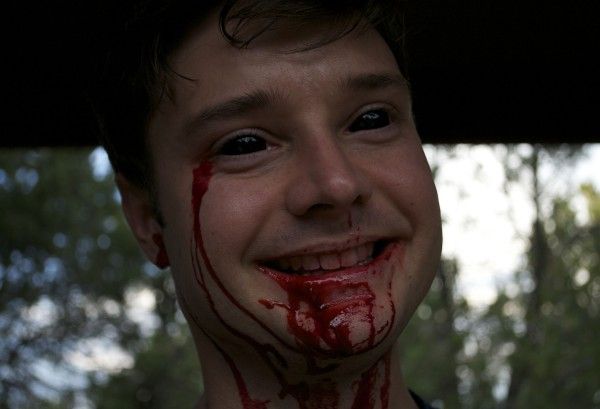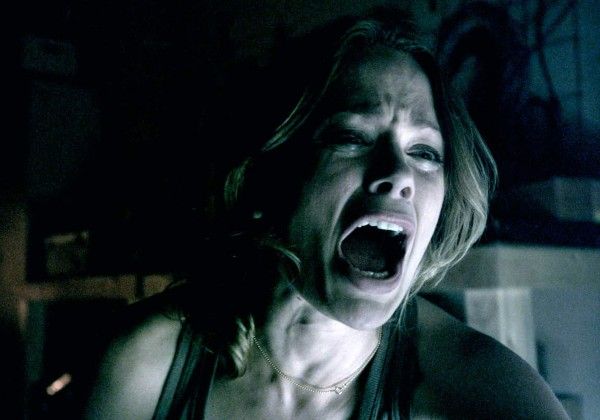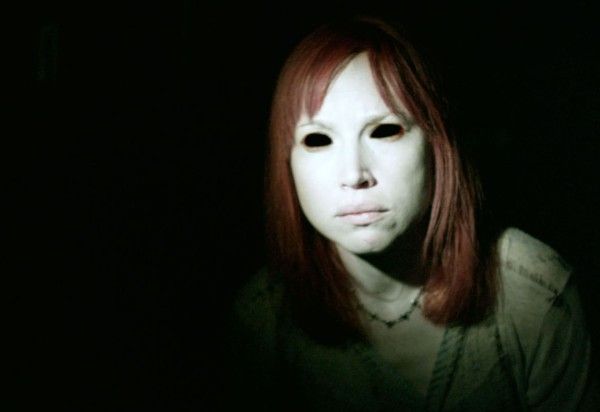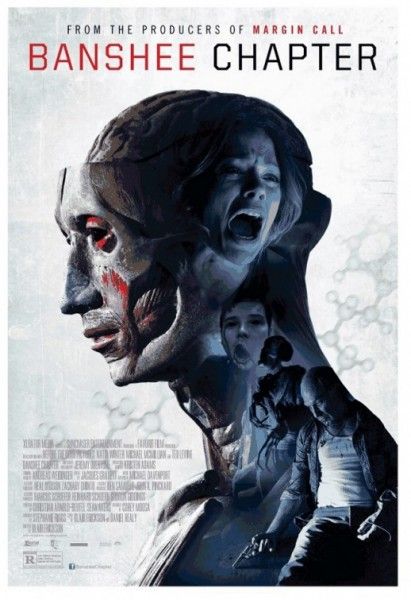From writer/director Blair Erickson, the indie horror thriller Banshee Chapter follows journalist Anne Roland (Sleepy Hollow’s Katia Winter), on the trail of her missing friend (True Blood’s Michael McMillian), who disappears after experimenting with mind-altering drugs. Aided by a rogue counter-culture writer (Ted Levine), Anne finds herself drawn into the dangerous world of top-secret government chemical research and the mystery of a disturbing radio signal of unknown origin. The film is based on real documents, actual test subject testimony and uncovered covert programs run by the CIA.
During this recent exclusive phone interview with Collider, executive producer Zachary Quinto talked about how his production company, Before the Door, became involved with this film, what it was about this particular story that made him want to get involved, including the found footage aspect in an effective way, finding the right cast, and the hope that word-of-mouth will give this film momentum. He also talked about what’s up next for him, as an actor and a producer, why he couldn’t be a part of American Horror Story: Coven (after terrific performances in the first two seasons), what he enjoys about being a producer and telling stories that he isn’t necessarily a part of, as an actor, and the goals for his production company. Check out what he had to say after the jump.
Collider: How did you come to be a producer on this film? Was this script sent to your production company, Before the Door, and you read it and responded to it, or did it take a less direct route than that?
ZACHARY QUINTO: Well, we have a history with Blair Erickson, who wrote and directed the film. He was also a student at Carnegie Mellon, which is where myself and my two producing partners went to college. We’re always a little more open to material from people from that particular path. Supporting new voices and supporting first-time writer/directors is something we’re really interested in, at my company. So, it basically came to us through my producing partner Corey Moosa and his connection to Blair from Carnegie Mellon. And then, from there, we read the script and responded to it, and it became a creative decision. But initially, that’s what made it stand out from other things that we’d been sent.
What was it about this particular story that drew you to it and made you want to get behind it?
QUINTO: I really am interested in stories that are rooted in some kind of historical context. I like that this had some roots in that, and it was an interesting point of entry. And then, from there, I liked the unsettling perspective and the found footage quality of the film. I felt like it was murky and blurry, and you didn’t necessarily know where you were meant to be watching this from. That was very interesting to me, as well. There were a lot of elements of it that I found fascinating. I liked that there were straight-up, jump-in-your-seat scares, but there was also the longer view of the slow-burn, anxiety-building scares that are more about a mood or a tone. There was a lot going for it, I thought.
Because of that mix of scares, you never really knew when they were going to happen or where they were going to be coming from.
QUINTO: Yeah. And those number stations creeped me out, in a huge way.
Is this the kind of film that you, personally, like to go see, or are you more of a scaredy cat?
QUINTO: I’m not afraid. I don’t get scared in movies like that, so much. I don’t necessarily seek them out, but I would maybe see this one. I would definitely tell people to go see it. But myself, I don’t know. My appetite, as an audience member, doesn’t necessarily lean toward the horror genre, but sometimes it does.
When you first read this script, was it developed enough that what we see now is pretty close to what you read, or was there time spent on developing it and changes things?
QUINTO: Only a little bit. Blair was really open to people’s responses and suggestions, and took some notes early on. But, it wasn’t so far off from what you see now that it was a different kind of movie. It was pretty well in that same vein of storytelling.
Since it seems like the vision would be really important for a film like this, did it help that he was the writer and director for this?
QUINTO: That can go either way, but in this case, it did feel like it worked to his and our advantage. He had a clear sense of how he wanted to tell the story, and the story that he wanted to tell, so that made everybody’s job a little bit easier.
With this blend of fact and fiction, and the story having some base in things that really happened, was it important to shoot some of this documentary style and have that found footage aspect?
QUINTO: I do think that was an important part of it, and is part of what makes it a little bit of a unique story, in that regard. And I’m interested in that. I personally find that fascinating. You don’t know where this story is coming from, or what place you’re meant to experience it from, and that’s an added development of unsettlingness, if that’s a word. I felt like that was something that Blair handled really well, and I was glad about that. When he was talking about it, he made a real clear argument for all of those perspectives, and it adds up to something that you can track within the film.
How did the casting process work? Katia Winter has quite a bit of visibility now, with the success of Sleepy Hollow, but what led you to her for this?
QUINTO: This was a pretty traditional one. We put out a couple of offers and read some people, and Katia was very clearly the choice. She just did a really great job. I felt that she captured a lot of the qualities that Blair wanted for Anne. I was involved by reaching out to agents and getting people to put themselves on tape, and then we were all involved in watching them and making the final decision, but obviously, it came down to Blair’s choice, in the end.
Aside from the exception of Ted Levine, do you think it’s important for a film like this to have actors who aren’t necessarily as familiar or well-known to audiences, so that it makes it scarier?
QUINTO: Well, it makes it scarier because you’re not associating the actor that you’re watching with characters that they’ve played, or other projects that you’ve seen them in. So, yeah, that adds an element to it that lends a little bit more of the authenticity and believability of the story unfolding because you’re not so distracted by somebody you might have seen a million times, in a different scenario. But, the challenge there is finding actors who are really good. Actors like Katia, Ted Levine and Mike McMillian are of an enormous caliber and work all the time. I think it also speaks to their talent, as actors, that they’re able to create characters so different from other things that they’ve played, that they’re not immediately recognizable.
How difficult is it to market a film like this, and get the word out in a way that lets people know the kind of movie they can expect without revealing too much?
QUINTO: It’s tricky. A lot of it becomes about word-of-mouth, and we’re certainly grateful to be able to talk about it and put the would out there. People have to trust. And hopefully, once people start to see the movie, it will get some momentum from that, as well.
Since the next Star Trek movie won’t be going into production for awhile, what’s up next for you, as a producer and an actor?
QUINTO: I’m choosing from projects now. I’ve been doing a play on Broadway for the past four months, and I have two months to go, so I’m now starting to figure out what I’m going to do after that. So, I’m reading a lot of scripts and making a lot of decisions right now. We have a bunch of projects in line for our production company, some of which involve me being an actor and some of which don’t. Things are really revealing themselves now. We’re about to start production on J.C. Chandor’s third movie, called A Most Violent Year. And then, we have two other projects right behind that, that are about to go, as well. So, we have no shortage of stuff that’s happening. We’re just trying to measure our steps and make good choices.
Was doing the play on Broadway what kept you from being able to be a part of American Horror Story again this season?
QUINTO: They’re shooting in New Orleans and I’m doing the play in New York, so my availability wasn’t lined up with their schedule, so I guess so. But, I’ve had good opportunities there to explore a lot of different landscapes, and I’ve had a great time doing it.
Is Star Trek such a well-oiled machine now that you guys know what you’re doing, regardless of who’s at the helm of the next film?
QUINTO: We are all going to come back to the third movie, knowing exactly what we want to do with our characters, and hope that the person who’s at the helm is supportive of that and collaborative. I’m sure they will be.
What do you enjoy most about being a producer and telling stories that you aren’t necessarily a part of, as an actor?
QUINTO: I love supporting emerging voices, and new writers and directors. I love engaging an audience in a way that doesn’t have to involve me, personally, and yet still generates an experience for groups of people. I also love giving people work and creating opportunities for people, and I love being involved in telling interesting stories.
When you started your production company, did you have specific goals that you set out with, and are those goals pretty much the same now?
QUINTO: Yeah, in some ways, we’re right in line with where we want to be, and in some ways, we’re far ahead of where we thought we’d be. We want to tell good stories and do good work. We want to be responsible producers. We want to be on time and on budget. Those are very practical goals. And we want to tell socially relevant stories that are, in some way or another, innovative and engaging for an audience. We want to give audiences something to talk about and think about. So, we’re growing and our experiences are expanding, and we’re grateful for that. Now, we have to figure out how to benefit from that, creatively and financially, as a company.
Banshee Chapter is now available on VOD, and will open in theaters on January 10, 2014.





